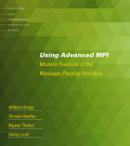Home
Publications
edited volumes
Awards
Research
Teaching
Miscellaneous
Full CV [pdf]
ew-hoefe
BLOG
bio


Events





Past Events






|
Publications of Torsten Hoefler
Asif Ali Khan, Hauke Mewes, Tobias Grosser, Torsten Hoefler, Jeronimo Castrillon:
| | | Polyhedral Compilation for Racetrack Memories
(IEEE Transactions on Computer-Aided Design of Integrated Circuits and Systems. Vol 39, Nr. 11, IEEE, Nov. 2020)
AbstractTraditional memory hierarchy designs, primarily based on SRAM and DRAM, become increasingly unsuitable to meet the performance, energy, bandwidth, and area requirements of modern embedded and high-performance computer systems. Racetrack memory (RTM), an emerging nonvolatile memory technology, promises to meet these conflicting demands by offering simultaneously high speed, higher density, and nonvolatility. RTM provides these efficiency gains by not providing immediate access to all storage locations, but by instead storing data sequentially in the equivalent to nanoscale tapes called tracks . Before any data can be accessed, explicit shift operations must be issued that cost energy and increase access latency. The result is a fundamental change in memory performance behavior: the address distance between subsequent memory accesses now has a linear effect on memory performance. While there are first techniques to optimize programs for linear-latency memories, such as RTM, existing automatic solutions treat only scalar memory accesses. This work presents the first automatic compilation framework that optimizes static loop programs over arrays for linear-latency memories. We extend the polyhedral compilation framework Polly to generate code that maximizes accesses to the same or consecutive locations, thereby minimizing the number of shifts. Our experimental results show that the optimized code incurs up to 85% fewer shifts (average 41%), improving both performance and energy consumption by an average of 17.9% and 39.8%, respectively. Our results show that automatic techniques make it possible to effectively program linear-latency memory architectures such as RTM.
Documentsdownload article: 
| | | BibTeX | @article{,
author={Asif Ali Khan and Hauke Mewes and Tobias Grosser and Torsten Hoefler and Jeronimo Castrillon},
title={{Polyhedral Compilation for Racetrack Memories}},
journal={IEEE Transactions on Computer-Aided Design of Integrated Circuits and Systems},
year={2020},
month={Nov.},
volume={39},
number={11},
publisher={IEEE},
source={http://www.unixer.de/~htor/publications/},
} |
|
|



























